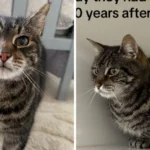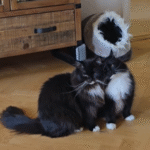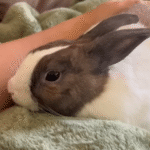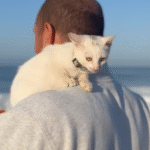Have you ever had one of those days where everything just seems to go wrong, and suddenly your cat curls up beside you, purring softly as if they know you need comfort? For many cat owners, these moments feel almost magical—a silent, furry friend offering solace when words fail. But is this just coincidence, or do our feline companions truly sense when we’re feeling down? The bond between humans and cats is deeper and more mysterious than we often realize, and exploring this connection can reveal some surprising truths about how cats respond to our emotions.
The Emotional Intelligence of Cats

Cats have long been misunderstood as aloof or indifferent, but recent research suggests they possess a remarkable emotional sensitivity. Unlike dogs, who are known for their overt displays of affection, cats demonstrate their understanding in subtler ways. They may not come bounding over with wagging tails, but they notice changes in our behavior, tone, and even body language. When you’re upset, your cat might observe you more closely, choosing to stay near or offer gentle headbutts. This quiet support hints at an intuitive grasp of human emotions that is often underestimated.
Recognizing Human Behavioral Cues

One of the ways cats may pick up on your bad day is by reading your body language. If you’re slouched on the couch, sighing, or moving more slowly, your cat is likely to notice. Cats are keen observers; they watch for patterns and changes in their environment, including your daily routines. If you break from your usual habits—perhaps skipping playtime or speaking less—they may interpret these as signs that something isn’t right. Just as they notice when you reach for their food bowl, they’re tuned in to when you’re not yourself.
The Power of Scent and Sound

Cats rely heavily on their senses, especially scent and sound, to interpret the world around them. When you’re stressed or sad, your scent can subtly change due to hormonal shifts. Your voice may also sound different—quieter, shakier, or softer. Cats can pick up on these subtle cues, sometimes responding by sitting closer or softly meowing. They may even knead you or purr more often, actions believed to be both self-soothing and comforting to their humans. These sensory abilities enable cats to respond to your mood in ways that can seem almost psychic.
Physical Closeness and Comforting Behaviors

Many cat owners notice their pets become more affectionate when they’re feeling low. Your cat might curl up beside you, rest their head on your lap, or even bring you a favorite toy. These behaviors aren’t just random. Cats often respond to distress in their humans by increasing physical contact, much like how they would comfort a fellow cat. Their presence can feel grounding, offering a silent companionship that says, “I’m here.” This physical closeness can be incredibly soothing, creating a sense of warmth and connection during tough times.
Routine Disruption and Cat Reactions

Cats are creatures of habit, thriving on routine and predictability. When you’re having a bad day, your behavior may disrupt their usual schedule. You might come home later, skip playtime, or forget to feed them on time. While some cats react with frustration, others respond with curiosity or concern. It’s not uncommon for a cat to follow you from room to room, vocalize more, or sit and stare with wide, questioning eyes. This shift in their behavior is often their way of checking in and trying to understand what’s changed in their world—and yours.
Scientific Studies on Cat-Human Empathy

While the idea of empathetic cats might sound like wishful thinking, science is beginning to catch up. Recent studies have shown that cats can distinguish between different human emotions, responding differently to happy, angry, or sad faces and voices. In some experiments, cats approached their owners more often when they appeared sad or distressed. They may not possess empathy in the human sense, but evidence suggests cats are attuned to our emotional states and can adapt their behavior accordingly. This emerging research adds weight to what many cat lovers have suspected all along.
Personal Stories That Tug at the Heart

There’s no shortage of touching stories from cat owners who swear their feline friends knew just when to offer comfort. From curling up beside a grieving owner to gently patting a crying child’s face, these real-life anecdotes paint a vivid picture of cats as intuitive companions. One woman recalls her cat never leaving her side during a period of illness, while another describes her usually independent tomcat suddenly becoming a lap cat after a job loss. These stories, though anecdotal, highlight the deep and sometimes mysterious bond between humans and cats.
Strengthening the Human-Cat Bond

Understanding that your cat may sense your bad days opens up new ways to strengthen your relationship. Take time to acknowledge their comforting gestures, even if they’re as simple as a quiet presence. Engage in gentle play or offer extra pets when you’re feeling down; this not only reassures your cat but can also lift your own spirits. Remember, your cat’s attempts to comfort you are their way of showing love. By responding with gratitude and affection, you reinforce a unique and supportive bond that benefits both of you.

Growing up traveling and experiencing new cultures and wonders, I have had a passion for nature, adventuring, photography, and videography. I am currently working towards a BSc in Biodiversity and Ecology at Stellenbosch University, and I hope to specialise in Marine Sciences one day.
Please send any feedback to Feedback@animalsaroundtheglobe.com






